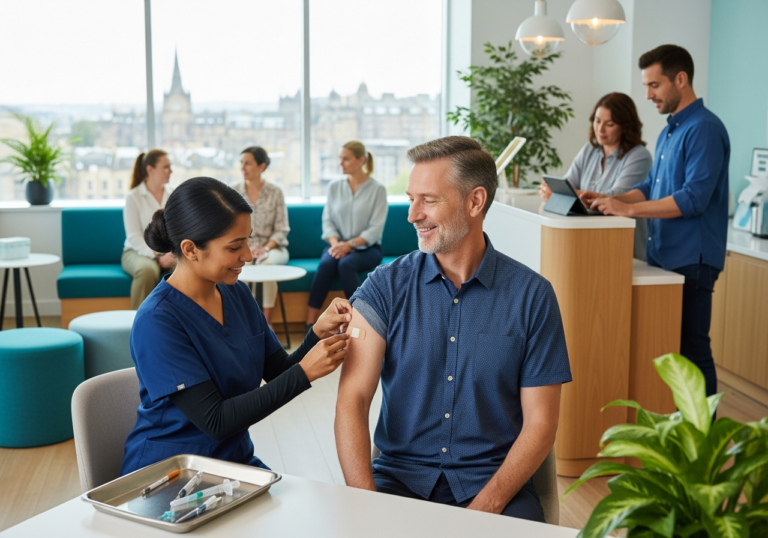Dengue Is on the Rise – And the Vaccine Is a Game Changer
As travel becomes more accessible, many Brits are venturing into tropical and subtropical destinations where dengue fever is a growing concern. Whether you’re planning a backpacking trip through Southeast Asia, a business visit to Brazil, or a family holiday in the Caribbean, understanding how to protect yourself from mosquito-borne illnesses is essential.
One of the most significant breakthroughs in recent years has been the development of a dengue fever vaccine. Still relatively new, it’s generating plenty of questions among travellers and healthcare professionals alike. Let’s unpack the key facts so you can make an informed decision before your next adventure.
1. Dengue Fever Is More Widespread Than You Might Think
Many people assume dengue is confined to remote or deeply rural areas, but that’s no longer the case. Recent outbreaks have affected major urban centres in countries like Thailand, Brazil, India, and even some areas of the southern United States. The World Health Organization estimates there are around 390 million dengue infections each year, with climate change and increased global travel contributing to its spread.
If you’re visiting Asia, South America, Africa, or the Pacific Islands, it’s worth checking whether dengue is present in your destination — chances are, it might be. The vaccine offers a proactive layer of protection if you’re travelling to a high-risk area.
2. The Dengue Vaccine Available in the UK Is Called Qdenga
In the UK, the dengue vaccine currently offered to travellers is Qdenga (also known by its scientific name TAK-003). It was approved by the European Medicines Agency in 2022 and has since become available through private travel clinics.
Unlike the earlier Dengvaxia vaccine, which had usage limitations based on prior infection status, Qdenga is suitable for individuals regardless of whether they’ve previously contracted dengue. This makes it a more accessible option for travellers seeking a reliable preventative measure against all four strains of the dengue virus.
3. It’s a Two-Dose Schedule — So Plan Ahead
Qdenga requires two doses, spaced three months apart. This means you’ll need to plan your vaccination schedule well before your departure date. If you’re travelling soon and can’t complete the full course, speak to a travel health specialist — even a single dose may offer partial protection, although two doses are recommended for full efficacy.
This highlights the importance of visiting a travel clinic early in your trip planning process. Getting ahead of your itinerary ensures you have time to complete the vaccine schedule and build adequate immunity.
4. The Vaccine Protects Against All Four Dengue Serotypes
Dengue fever is caused by four closely related viruses, known as DENV-1 through DENV-4. Infection with one type provides lifelong immunity to that specific strain, but only temporary and partial immunity to the others — which is why second infections can be more severe.
What sets Qdenga apart is that it’s designed to offer cross-protection against all four serotypes. This broad coverage is particularly important because you can’t control which strain you’ll be exposed to while abroad. Having a vaccine that covers all bases means you’re significantly reducing your risk of both initial and subsequent infections.
5. It’s Not a Substitute for Mosquito Bite Prevention
While the vaccine is a powerful tool in the fight against dengue, it doesn’t mean you can ditch your insect repellent and long sleeves. No vaccine offers 100% protection, and dengue is transmitted by Aedes mosquitoes, which are active during the daytime.
So, alongside the vaccine, it’s still crucial to follow standard bite-prevention measures: use DEET-based repellents, wear light-coloured clothing that covers your limbs, and sleep under mosquito nets if needed. Think of the vaccine as part of a comprehensive travel health strategy, not a standalone solution.
6. Side Effects Are Generally Mild and Temporary
As with any vaccine, Qdenga may cause some side effects, but they’re usually short-lived. Most commonly, people report mild pain at the injection site, fatigue, headache, or a low-grade fever — symptoms that typically resolve within a day or two.
Serious reactions are rare, and the vaccine has undergone rigorous international testing for safety and effectiveness. It’s always a good idea to discuss any medical concerns with your travel health provider, particularly if you have a history of allergies or immune conditions.
7. It’s Especially Worth Considering for Long-Term or Repeat Travellers
If you’re planning an extended stay in a dengue-endemic country — say for volunteering, work, or visiting family — the vaccine could be an especially wise investment. Likewise, if you’re someone who frequently travels to tropical regions, building long-term immunity helps reduce your cumulative risk over time.
Even if you’ve had dengue before, Qdenga may still be beneficial. Secondary infections can be more severe due to a phenomenon known as antibody-dependent enhancement (ADE), where pre-existing antibodies from a previous infection can actually worsen the next bout. Vaccination helps mitigate this risk by boosting your overall defences.
Planning Your Travel? Get Protected Early
Dengue fever can disrupt your trip in a big way — think high fevers, muscle pain, and days (or even weeks) of recovery. In more severe cases, it can lead to hospitalisation or life-threatening complications. Fortunately, with vaccines like Qdenga now available, protecting yourself is easier than ever.
If you’re heading somewhere with known dengue activity, don’t leave your health to chance. Speak with a qualified travel health professional and consider scheduling your dengue vaccine well in advance.
For personalised advice and to book your appointment, visit Edinburgh Vaccination Clinic. Your future self will thank you.





